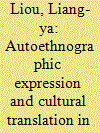| Srl | Item |
| 1 |
ID:
119189


|
|
|
|
|
| Publication |
2012.
|
| Summary/Abstract |
This article explores how three short stories set in 1980s Taiwan by the Taiwanese aboriginal writer Tian Yage (Tuobasi Tamapima) can be read as autoethnographic fiction as well as modern fiction, portraying contemporary Taiwanese aboriginal society caught between indigenous folkways and colonial modernity, and how the narrators of the stories tackle cultural translation. I begin with a discussion of Sun Ta-chuan's caution in 1991 as the Taiwan Aboriginal Movement was evolving into the Taiwan Aboriginal Cultural Revivalist Movement. After analysing anthropology's relationship with aborigines and imperialism, I apply Mary Louise Pratt's concept of autoethnography to the aboriginal activists' ethnographic studies and personal narratives. I argue that, prior to the Taiwan Aboriginal Cultural Revivalist Movement, Tian sought to construct an aboriginal cultural identity vis-à-vis the metropolis and to envision a cultural revival within the indigenous community, while he also explored the dilemmas and difficulties that arose from these. In the last section, I apply Homi K. Bhabha's theory of the untranslatable in cultural translation to further examine the language, the narrative voice and the form of both autoethnographic fiction and modern fiction in Tian's stories. I argue that writing Chinese-language modern fiction is a tacit recognition on Tian's part of the legacy of colonial modernity, but the purpose is to manoeuvre for a rethinking of the Taiwanese modern subject. As the narrative voice of his stories is one of an aboriginal speaking as a subject rather than an object, speaking with the backdrop of the aboriginal village as the locus of indigenous traditions vis-à-vis the dominant society, Tian is implicitly demanding aboriginal rights and a reconsideration of the Taiwanese modern subject as well as a shift in the paradigm of historiography on Taiwan.
|
|
|
|
|
|
|
|
|
|
|
|
|
|
|
|
| 2 |
ID:
111611


|
|
|
|
|
| Publication |
2012.
|
| Summary/Abstract |
Primarily aiming to highlight and exemplify how a technology can be socially and culturally appropriated, this article draws attention to the role of mobile phone communication in straining relations between married couples on the basis of material from Ethiopia. The findings show that mobile phone-mediated interactions between spouses are filled with monitoring and controlling activities, expressed in such forms as checking call logs, text messages, making casual calls, and switching-off phones, leading to highly strained relations that may result in the marital relation as a whole falling apart. These findings show how a technology can actively shape or influence interactions, and reveal interactions that might otherwise be concealed.
|
|
|
|
|
|
|
|
|
|
|
|
|
|
|
|
| 3 |
ID:
125902


|
|
|
|
|
| Publication |
2013.
|
| Summary/Abstract |
The 2011 protest wave, encompassing the Arab Spring revolutions, the Indignados movement in Spain and Greece, and the Occupy Wall Street movement has often been described as a new global protest cycle. However, the dynamics of diffusion suggest a more complex picture. Transmission of protest frames and repertoires from one country and cultural region to another was quite slow and tortuous. Moreover, adoption of the new ideas and practices of protest spawned by the protest wave of 2011 involved laborious dynamics of cultural translation and domestication. This situation points to the continuing importance of local protest cultures and cultural contexts, in addition to channels of transmission, even in an era of instantaneous communication technologies.
|
|
|
|
|
|
|
|
|
|
|
|
|
|
|
|